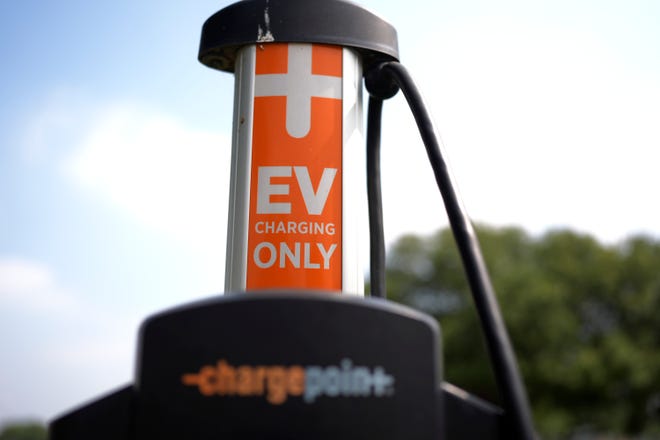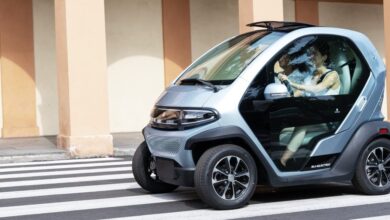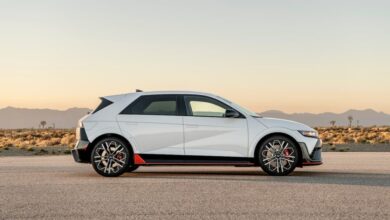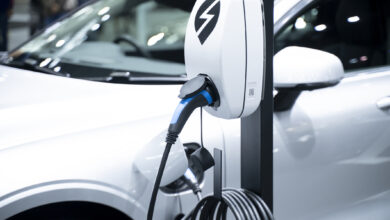Oil and gas groups suing Biden EPA over ‘EV mandate’

Washington — A coalition of oil and gas lobbying groups is suing the Biden administration to stop its new tailpipe emissions standards.
The lawsuit, led by the American Petroleum Institute and the American Fuel & Petrochemical Manufacturers, complains that Environmental Protection Agency regulations finalized in March will effectively end the sale of new, gas-powered vehicles by 2032.
“Today, we are taking action to protect American consumers, U.S. manufacturing workers and our nation’s hard-won energy security from this intrusive government mandate,” API Senior Vice President and General Counsel Ryan Meyers said, voicing a common refrain from opponents of electric vehicles.
The EPA rule does not prescribe one technological solution for reducing greenhouse gas emissions. In other words, it does not ban gas-powered cars or mandate electric vehicles. It is expected, however, to push the auto industry into greater adoption of hybrids and EVs into the next decade.
The final rule, which was scaled back from its initial proposal, suggests that EVs will make up between 35% and 62% of new car sales by 2032. Electric vehicle adoption has increased significantly over the past several years, though growth has slowed recently and remains well short of the EPA’s target market share.
Fully electric vehicles made up about 8.2% of new U.S. car sales last month, per data from Argonne National Laboratory. That’s down from a high-water mark of 10.6% in December 2023.
March 2024:Automakers get more time to ramp up EVs under final EPA emissions rules
The oil and gas groups filed their lawsuit Thursday to the D.C. Circuit Court of Appeals. They were joined by the National Corn Growers Association, American Farm Bureau Federation and several car dealerships as co-petitioners in the suit. Their complaint argues that the EPA has overstepped its authority under the Clean Air Act, which grants the agency power to regulate vehicle emissions.
“EPA has exceeded its congressional authority with this regulation that will eliminate most new gas cars and traditional hybrids from the U.S. market in less than a decade,” Meyers added. “We look forward to making our case in court.”
The AFPM suggested the lawsuit will probe at the “major questions” doctrine affecting federal agencies’ regulatory authority and specifically challenge the EPA’s broad approach to capping emissions.
“EPA also overstepped in finalizing fleetwide average standards, rather than concrete standards that all cars and trucks must meet. Since no gas, diesel or traditional hybrid today can meet 85 grams/mile, EPA’s averaging scheme — which is already being contested for the 2023-2026 standards — is clearly meant to force EV adoption,” said Chet Thompson, president and CEO of AFPM. “And the choice to ignore all other vehicle lifecycle emissions, save those from the tailpipe, puts internal combustion engine vehicles at an arbitrary disadvantage.”
A group of 25 Republican state attorneys general also sued the Biden administration over the rule in April.
More challenges — in the courts, legislatively from Congressional Republicans and politically from presumptive Republican presidential nominee Donald Trump — are likely for President Joe Biden’s regulatory push aimed at curbing pollution from consumer vehicles, which account for about 16% of U.S. greenhouse gas emissions.
Last week the Biden administration finalized new standards for vehicle fuel economy. It also, in March, adjusted a key calculation for determining the fuel economy scores for EVs and finalized stricter emissions standards for heavy-duty vehicles.
Last week:Biden scales back fuel economy standards amid tough political and business realities
Beyond its regulatory efforts, the administration also has been active in pushing Congress to adopt major legislation, like the Inflation Reduction Act and the CHIPS and Science Act, aimed at increasing domestic production and sales of EVs and related components.
Trump, for his part, said at a rally in Las Vegas, Nevada, last weekend that he’s a “big fan of electric cars” even though he has often bashed them and vowed to rescind Biden’s pro-EV policies. He also echoed common consumer concerns with EVs during the rally — that they’re too heavy, too expensive and do not have enough range.
Shailen Bhatt, administrator of the Federal Highway Administration, lamented Wednesday how politicized EVs have become.
“The only people who I’ve talked to who don’t politicize EVs these days are the governors of states where EVs are being manufactured in the United States,” he said at the Auto Tech Showcase 2024 in Washington.
Bhatt continued: “It is not a given that just because America won the 20th century and everybody came and bought our automobiles, that this will just continue in the 21st century if we’re not building out what the 21st century demands,” alluding to the global shift towards EVs and China’s emergence as a leader in that area.
“This is not a Democratic issue. It is not a Republican issue,” he added. “It is good for America when people buy our automobiles.”
gschwab@detroitnews.com
@GrantSchwab



